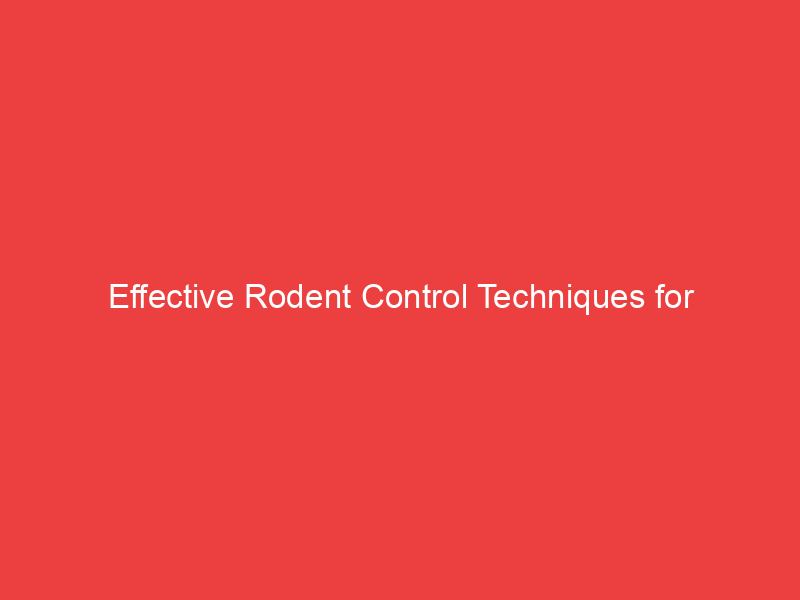Commercial spaces, such as offices, restaurants, and warehouses, can be highly attractive to rodents seeking shelter, food, and water. Rodents not only pose significant health risks, but they can also damage property and tarnish a business’s reputation. Therefore, it is crucial for commercial establishments to implement effective rodent control techniques to ensure a clean and pest-free environment. In this article, we will explore various strategies for understanding, inspecting, and preventing rodent infestations in commercial spaces.
Understanding the Rodent Problem
Before implementing any pest control measures, it is important to have a thorough understanding of the rodent problem at hand. This involves understanding the behavior, biology, and typical nesting areas of rodents commonly found in commercial spaces.
Identifying Common Rodents: The most common rodents found in commercial spaces are rats and mice. Rats are larger in size, with long tails and large protruding teeth, whereas mice are smaller in size and have a slenderer body shape.
Behavior and Biology: Rodents are nocturnal creatures that are adept at hiding and finding small entry points into buildings. They reproduce rapidly, with a single pair of rodents having the potential to produce hundreds of descendants within a year.
Typical Nesting Areas: Rodents typically nest in secluded areas such as storage rooms, basements, attics, and crawl spaces. They are attracted to food sources and areas with ample shelter, such as cluttered storage areas or HVAC ducts.
Implementing a Comprehensive Pest Inspection
To effectively manage a rodent problem, it is necessary to conduct a comprehensive pest inspection of the entire commercial space. This involves identifying potential entry points, assessing the level of infestation, and determining the best control methods. Here’s how to conduct a thorough inspection:
Seal Entry Points: Carefully inspect the exterior of the building for any cracks, holes, or gaps that could serve as entry points for rodents. Seal these openings with durable materials such as steel wool or caulking.
Identify Food Sources: Identify and eliminate any potential food sources that may attract rodents. This includes ensuring proper food storage, disposing of waste in sealed bins, and keeping garbage areas clean.
Inspect Interior Areas: Inspect all interior areas of the commercial space, including storage rooms, kitchens, and bathrooms. Look for signs of rodent activity, such as droppings, gnaw marks, or nests. Pay special attention to areas with moisture or clutter, as these are often attractive to rodents.
Implement Monitoring Devices: Place rodent monitoring devices, such as glue traps or electronic traps, in areas where rodent activity has been observed or is likely to occur. These devices can help you gauge the severity of the infestation and track rodent movement.
Choosing the Right Rodent Control Methods
Once a thorough inspection has been conducted, it is time to choose the most suitable rodent control methods for your commercial space. There are various options available, ranging from humane trapping to chemical treatments. Consider the following factors when selecting control methods:
Humane Trapping: Humane trapping is an ethical approach to rodent control that involves capturing rodents alive and releasing them into their natural habitat. This method works best for low-level infestations and when the rodents can be safely relocated.
Chemical Treatments: Chemical treatments, such as rodenticides, can be effective for managing larger infestations. These products are designed to kill rodents but should be used with caution to prevent harm to humans or non-target animals. It is important to follow the instructions provided by the manufacturer and consider hiring professional pest control services for chemical treatments.
Exclusion Measures: Exclusion measures involve sealing off potential entry points to prevent rodent access. This can be achieved by installing door sweeps, sealing gaps in walls or floors, and repairing damaged screens or vents. Exclusion measures work best when combined with other control methods.
Sanitation Practices: Maintaining a clean and sanitary environment is crucial for preventing rodent infestations. Regularly clean and disinfect areas prone to food residue, inspect and repair plumbing leaks, and ensure proper waste management practices are followed.
Maintaining an Ongoing Rodent Prevention Plan
Rodent control is an ongoing process that requires consistent effort and monitoring. To ensure long-term effectiveness, implement an ongoing rodent prevention plan within your commercial space. Here are some key steps to include in your preventive measures:
Regular Inspections: Conduct routine inspections to check for signs of rodent activity. Focus on vulnerable areas such as food storage areas, basements, and attics.
Employee Education: Train employees on proper sanitation practices, such as cleaning up food spills promptly, properly storing food, and reporting any signs of rodent activity.
Monitoring Devices: Continue to use monitoring devices in areas prone to rodent activity. Regularly check and replace these devices as needed.
Prompt Action: If signs of rodent activity are detected, take immediate action to address the issue. This may include additional trapping, exclusion measures, or seeking professional pest control services.
By implementing a comprehensive rodent prevention plan and consistently monitoring for signs of infestation, you can effectively control rodents in your commercial space and maintain a safe and clean environment for employees and visitors.
In conclusion, rodents can be a persistent problem in commercial spaces. However, by understanding the rodent problem, conducting thorough inspections, choosing the appropriate control methods, and implementing an ongoing prevention plan, you can successfully manage and prevent rodent infestations. Remember to prioritize the health and safety of individuals and consider seeking professional Rodent control Tucson for more severe or complex infestations.

